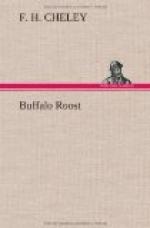His mother listened as he went on. “The schoolmaster was telling us today about the wonderful Rocky Mountains. He was there last summer on his vacation, you know. We were studying about Pike’s Peak and the Garden of the Gods, so he told us all about his trip there. He went from Colorado Springs to somewhere away up in the mountains to a great gold camp. He told us of the queer little shanties the people live in, and of the great piles of waste ore outside of each mine. He went through one mine, the Independence, I think he called it, or the Portland—I don’t remember which now; but he said the machinery used in hoisting the ore was wonderful. It all set me to thinking of father—I’ve been thinking of him all day. Mother, it’s mighty hard for a fellow like me not to have any father, only just a dead one.”
He arose a second time to replenish the fire, but remained standing, facing his mother. He was too deeply interested in his own thoughts just then to notice the tears that were slowly stealing down his mother’s face, and the light was too dim for him to see her sad, care-worn expression. She was not old, but fate had not been kind to her. She was a slender little woman, with a heavy mass of what had once been brown hair, but it was now streaked with gray. Her eyes were large and brown, and the intermingled expression of love and sadness made her face one of tender beauty, lighted as it was by the rosy tints from the open fire. As the boy talked on in his manly way she suddenly became aware of a change in him. She noticed the well-built and symmetrically developed body, the broad shoulders, the short, stocky neck, and the head covered with brown ringlets. She could not see the face, but she knew only too well of whom it reminded her, for of late she had often found herself saying, “Just like the father—just like the father.”
It was during such winter evenings as this that she had come to know her son best, as she sat on the arm of his chair and listened with tactful sympathy to his stories of the big black bass that kept house in the pool at the end of the lake, or of the downy woodpecker’s nest in the old hickory, or, perhaps, of the big hoot owl that perched on the granary warm nights to watch for mice. It was with a certain feeling of sadness, as well as of pride, that she watched him grow older, lose his boyhood ways, and become more and more of a man—a man just like his father!
“I get so lonely for some one to teach me things, and go with me into the big woods, and help me skin my rats in season,” he was saying, “and to teach me to use tools and to understand the books and—”
“Yes, my son,” she replied. “But haven’t you me? Won’t I do to read with you and help you find new wild flowers and gather strange caterpillars in the spring?”
“Yes, mother, of course you will, and you know how I do care for you. I couldn’t begin to do without you even for a day; but someway you don’t understand. It’s because you are a woman. Sometimes I feel as if I would be the happiest boy in the Clear Creek School if I just had a father I could look up to and be proud of and—”




